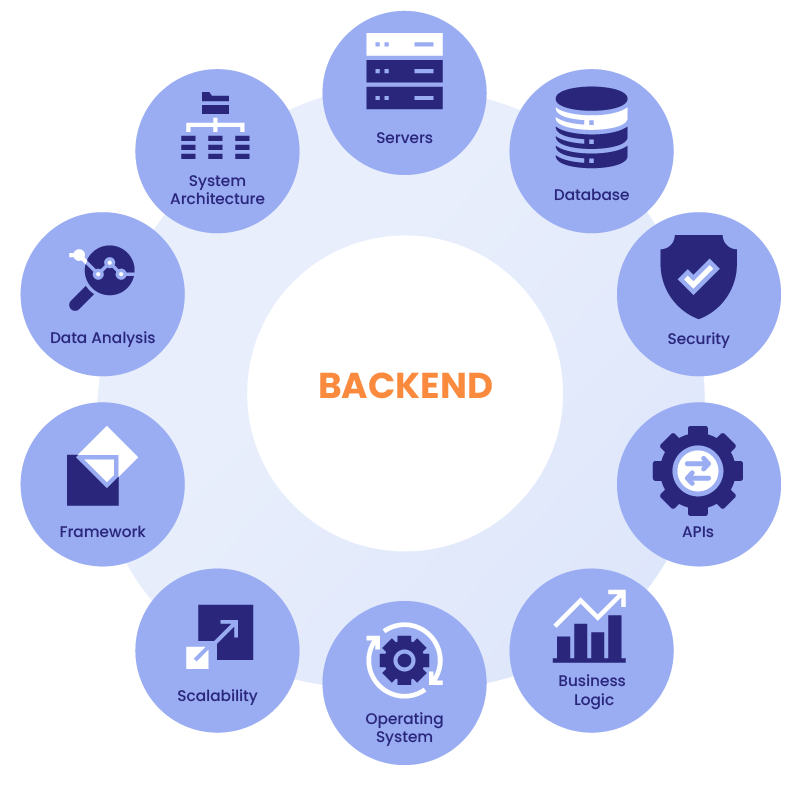Your agency may be struggling to keep up the pace because every day your clients demand seamless websites, robust databases, and efficient APIs. This is the matter of back-end development and managing an in-house team can be as complex as the very systems they build. So, what if I told you there’s a secret weapon at your disposal, a game-changer that can empower your agency to thrive? The answer lies in outsourcing. But before we delve into that, let’s explore the world of back-end development and the role of the back-end web developer in general.
In this article, you will also read the practical side of back-end development, especially within the context of the White Label Agency that’s been at the forefront of web development for a decade. With over 10,000 websites under its belt, we are no strangers to the complexity of code, servers, and databases that underpin the online experiences we all enjoy.
The skills and responsibilities of back-end developers
First, let’s focus on the essential skills. Back-end developers are fluent in programming languages such as Python, Ruby, Java, or PHP. These languages are their tools of the trade, allowing them to craft intricate code that powers websites and applications. They’re like linguistic virtuosos, speaking the language of computers with finesse.
Their expertise extends to databases like MySQL, PostgreSQL, or MongoDB. Think of them as data sculptors, molding information into structured databases that facilitate efficient storage and retrieval.
System administration is their forte. They’re the guardians of servers, ensuring they run like well-oiled machines, handling tasks like server configuration, maintenance, and security.
Now, let’s delve into what they do. Back-end web developer is an architect of the digital world. They design, develop, and maintain websites, meticulously crafting the server-side logic that brings websites to life. They’re the maestros who ensure your online presence isn’t just functional but performs at its peak.
They’re also the creators of APIs (Application Programming Interfaces), the bridges that enable different software components to communicate effortlessly. APIs make your applications more versatile and interconnected, facilitating a seamless user experience.
Lastly, they’re the guardians of your databases. Responsible for storing, retrieving, and safeguarding critical data, they ensure that your business operations rely on a solid and secure data foundation.

Effectively managing your back-end development team
Now that we’ve uncovered the skills and responsibilities of back-end web developers, let’s shift our focus to something equally vital: managing the team that brings these digital architects together. Managing a back-end development team isn’t just about supervising; it’s about fostering an environment where their skills shine.
One key aspect is setting clear goals and expectations. Picture it as the roadmap for your team’s journey. Clear objectives help them understand their role in the bigger picture, making their work more purposeful.
Regular feedback is another cornerstone. Just as back-end developers fine-tune their code, your feedback fine-tunes their performance. It’s a collaborative process that enables them to continuously improve and deliver exceptional results.
And let’s not forget about conflict resolution. In any team, differences of opinion can arise. It’s essential to address conflicts promptly and constructively, turning potential roadblocks into opportunities for growth.
Remember, your back-end development team doesn’t work in isolation. They’re a crucial part of the broader development ecosystem. Communication and collaboration between the front-end and back-end teams are essential. Just as gears in a well-oiled machine must mesh seamlessly, so too must these teams work together harmoniously to create exceptional digital experiences.
So, managing back-end web developer isn’t just about overseeing tasks; it’s about creating an environment that nurtures their talents, promotes collaboration, and ultimately drives success.

White Label Agency: The ally in your corner
Now, let’s explore how partnering with the WLA can be a game-changer for small agencies in the realm of back-end development.
Imagine having a reliable ally who specializes in back-end development, ready to support your agency’s needs. That’s precisely what the White Label Agency offers. We bring a wealth of experience and expertise to the table, with a track record that speaks for itself – a solid decade of experience and a staggering 10,000 websites developed. That’s a testament to our prowess in the field.
But why should you consider teaming up with the WLA? Well, for starters, it can significantly reduce costs. No need to invest in building and maintaining an in-house back-end web developer team. Instead, you gain access to a seasoned pool of talent, a resource that might have been out of reach otherwise. Whether you choose to hire a dedicated developer or outsource project-based tasks.
Moreover, it’s not just about saving money; it’s about gaining peace of mind. With a White Label Agency by your side, you can focus on what you do best – serving your clients and growing your agency – while they handle the complex world of back-end development.
So, in a nutshell, the WLA isn’t just a service provider; they’re your trusted partner, your secret weapon in delivering top-notch digital solutions, and your ticket to a brighter and peaceful future.
So if you are in need of a helping hand in this fast-paced environment, don’t hesitate to contact our sales team. At The White Label Agency, we firmly believe in the power of custom solutions. We have worked with over 600 clients and we have extensive experience in delivering sites for any kind of niche industry. Our guarantees on timeliness and our eagerness to exceed expectations are what sets us apart in the competitive market of WordPress outsourcing.



